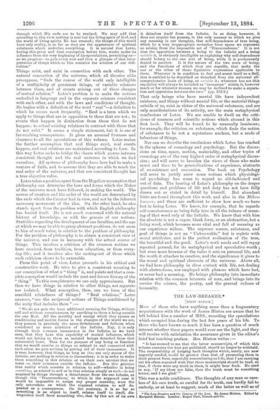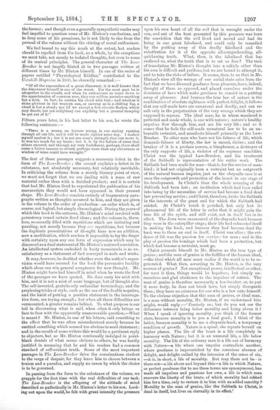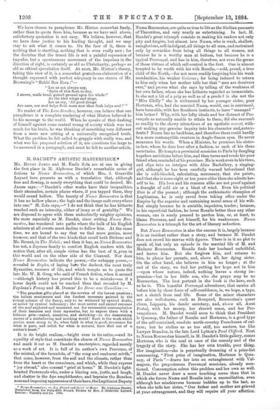MOST of those who have anything more than a fragmentary
acquaintance with the work of James Hinton are aware that he left behind him a number of MSS., recording the speculations which occupied him during the last few years of his life. To those who have known so much it has been a question of much interest whether these papers would ever see the light, and they will receive with satisfaction the assurance given in the editor's brief but touching preface. Mrs. Hinton writes :—
" It has seemed to me that the latter manuscripts, of which this volume contains the first yet published, should no longer be withheld. The responsibility of keeping back thoughts which, surely, are now urgently needed, would be greater than that of presenting them in their present form, especially remembering as I do, that I am carrying out his often-repeated wish that these manuscripts should be read, so that, if there were any truth in them, it might bear fruit. He used to say, If my ideas are false, then the truth most be something better, and I am glad.'" This was a noble confidence. The thoughts of any man so care- less of his own truth, so careful for the truth, can hardly fail to embody, or at least to suggest, much of the latter as well as of The Law-Breaker and the Coming 0:( the Law. By James Hinton. Edited by Margaret Hinton. London : Kagan Pant, Trench and Co.
the former; and though even a generally sympathetic reader may feel impelled to question some of Mr. Hinton's conclusions, and to deny some of his premisses, he is not likely to rise from the perusal of the volume without the stirring of moral enthusiasm.
We feel bound to say this much at the outset, lest readers should be repelled from the book, as a whole, by the exceptions we must take, not merely to isolated thoughts, but even to some of its central principles. The general character of The Law- Breaker is not inaptly hinted at in two passages written at different times by Mr. Hinton himself. In one of the series of papers entitled "Physiological Riddles," contributed to the Cornhill Magazine in 1860, he shrewdly remarked :—
"Of all the expounders of a great discovery, it is well known that the discoverer himself is one of the worst. For the most part he is altogether in the clouds, and when he endeavours to come down to the apprehension of common men, they can seldom perceive anything bat a mist. In fact, he carries his cloud with him ; and whetter it shine glorious in the western sun, or enwrap us in a chilling fog, a cloud is but a cloud; nor (if we except a few electric flashes, which may dazzle, but not enlighten) can anything but a general damping be got out of it."
Fifteen years later, in his last letter to his son, he wrote the following sentences :—
"There is a wrong, an intense wrong, in our society running through all our life, and it will be made righter some day. I dashed myself against it ; but it is not one man's strength that can move it. It was too much for my brain ; but it is by the failure of some that - others succeed, and through my very foolishness, perhaps, there shall come a better success to others, perhaps more than any cleverness or wisdom of mine could have wrought."
The first of these passages suggests a necessary defect in the form of The Law-Breaker ; the second explains a defect in its substance, not absolutely necessary, but relatively inevitable. In criticising the volume from a merely literary point of view, we must not forget that we are dealing with a mass of raw material rather than with a finished product ; and it is certain that had Mr. Hinton lived to superintend the publication of his manuscripts they would not have appeared in their present shape. The Law-Breaker consists entirely of fragmentary para- graphs written as thoughts occurred to him, and they are given in the volume in the order of production—an order which is, of course, not logical, but simply chronological. During the years of which this book is the outcome, Mr. Hinton's mind revolved with persistency round certain fixed ideas ; and the volume is, there- fore, necessarily filled with repetitions which are irritating and puzzling, not merely because they are repetitions, but because the duplicate presentations of thought have now an addition, now a modification, which renders it impossible to lay the finger with certainty -upon any one form of expression which may be discussed as a final statement of Mr. Hinton's matured conviction. An intellectual system embodied in hasty memoranda is as un- satisfactory as a statement of fact conveyed in nods and winks.
It may, however, be doubted whether even the author's super- vision would have secured for the book the persuasive lucidity which alone can win general acceptance for new thought. Mr. Hinton might have had himself in mind when he wrote the first of the passages we have quoted. He does carry his mist with him, and it is not a mist of mere language, but of thought also. The self-invented, gratuitously unfamiliar terminology, and the perplexing tricks of style, such as the use of the double negative, and the habit of putting a positive statement in the interroga- tive form, are trying enough ; but when all these difficulties are surmounted, a greater remains behind. To what purpose is our toil in discovering what is said, when often it only brings us face to face with the apparently unanswerable question,—What is meant? Mr. Hinton, in one of his letters, said something to the effect that he was often misunderstood merely because he omitted something which seemed too obvious to need itatement ; and in the mouth of some writers this would be a pertinent reply to objectors, but as Mr. Hinton continually indulged in point- blank denials of what seems obvious to others, he was hardly justified in assuming that he and his readers had a common standard of self-evident truth. Some of the most important passages in The Law-Breaker drive the conscientious student to the verge of despair, for they leave him to choose between a truism and a paradox, and supply no canon by which the choice is to be governed.
In passing from the form to the substance of the volume, we grapple for the first time with the real difficulties of our task. The Law-Breaker is the offspring of the attitude of mind described so pathetically in Mr. Hinton's letter to his son. Look- ing out upon the world, he felt with great intensity the pressure upon his own heart of all the evil that is wrought under the sun, and out of the heat generated by this pressure was born the conviction that the evil lived and moved and had its being in one great falsehood, and could only be remedied by the putting away of this deadly falsehood and the substitution for it of the opposite all-comprehending, all- quickening truth. What, then, is the falsehood that has enslaved us, what the truth that is to set us free ? The task of translating Mr. Hinton's thought into a vehicle other than his own is difficult and perilous, but we are bound to attempt it, and to take the risks of failure. It seems, then, to us that in Mr. Hinton's view all the wrongs of our social state arise from the fact that we have divorced goodness from pleasure, have, indeed, thought of them as opposed, and placed ourselves under the dominion of laws which make goodness to consist in a putting away of pleasure. And because the true law of nature is the combination of absolute rightness with perfect delight, it follows that our self-made laws are unnatural and deadly, and can re- sult only in the perpetuation of the very wrongs which they are supposed to repress. The ideal man, he in whom manhood is perfected and made whole, is one with nature ; nature's healthy impulses flow through him, and are his very life ; and so it comes that he feels the self-made unnatural law to be an un- bearable restraint, and manifests himself primarily as the Law- Breaker. To other men who have not his fulness of life, which demands fulness of liberty, the law is sacred, divine ; and the breaker of it is a profane person, a blasphemer, a destroyer of the only supports of life, a violator of its supreme sanctities. Christ was the typical Law-Breaker, and his treatment of the Sabbath is representative of his entire work. The Sabbath had been made for man—that is, for the service of man- kind; it had not originally been a restraint but an outgrowth of the natural human impulse, just as the chrysalis case is at once the outgrowth and protection of the insect in one stage of its development. In Christ's time the whole meaning of the Sabbath had been lost ; an institution which had been called into being by the necessities of service had become a fixed dead law preventing service ; and Christ, therefore, broke the Sabbath in the interests of the great end for which the Sabbath had existed. At Christ's touch it perished, but only lost its phenomenal life of the letter in order that it might gain the true life of the spirit, and still exist, not in itself but in its effect. The Jews were enamoured of the chrysalis husk because they were in the caterpillar stage ; their life had exhausted itself in making the husk, and because they had become dead the husk was to them an end in itself. Christ was alive ; the evi- dence of life was the passion for service— for man ; and in the play of passion the bondage which had been a protection, but which had become a restraint, must go.
Christ presents himself to Mr. Hinton as the true type of genius ; and the man of genius is the fulfiller of the human ideal, — the ideal which all men must realise if the world is to be re- generated. What then, according to Mr. Hinton, is the very essence of genius ? Not exceptional power, intellectual or other, for were it thus, things would he hopeless ; but simply un- conscious and glad obedience to the impulses of nature. The man of genius is therefore necessarily a law-breaker, or, to put it more truly, he does not break laws, but simply disregards them ; they have no existence for one who is a law unto himself. To the obvious objection that this man of genius, or ideal man, is a man without morality, Mr. Hinton, if we understand him aright, would reply Precisely so ; but do you not see the difference between being below morality and being above it ? When I speak of ignoring morality, you think of the former state, because morality is to you a final good; I think of the latter, because morality is to me a chrysalis-husk, a temporary condition of growth. Nature is a spiral, she repeats herself on higher planes. The life of the beast is a life completely in harmony with Nature ; but it is an unmoral life, a life below morality. The life of the ordinary man is a life out of harmony with Nature—a life where one impulse contradicts another, where goodness is impoverished by the conscious absence of delight, and delight sullied by the intrusion of the sense of sin,
— it is, in short, a life of morality. But may there not be—is there not—a life above and beyond this—a life in which Nature, or perfect goodness (for to me these terms are synonymous), has made all impulses and passions her own, a life in which man recovers the liberty of the brute, of which morality had robbed him for a time, only to restore it to him with an added sanctity ? Morality to the man of genius, like the Sabbath to Christ, is dead in itself, but lives on eternally in its effect.'
We have chosen to paraphrase Mr. Hinton somewhat freely, rather than to quote from him, because as we have said above, satisfactory quotation is not easy. We believe, however, that we have done justice to his leading thought, and we may stay to ask what it comes to. On the face of it, there is nothing that is startling, nothing that is even really new ; for the doctrine that the truest life is not a painful repression of impulse, but a spontaneous movement of the impulses in the direction of right, is certainly as old as Christianity, perhaps as old as ethical speculation itself. At most, Mr. Hinton's theory, taking this view of it, is a somewhat gratuitous elaboration of a thought expressed with perfect adequacy in one stanza of Mr.
Browning's "Rabbi Ben Ezra :"—
" Let us not always say,
Spite of this flesh to-day, I strove, made head, gained ground upon the whole !'
As the bird wings and sings, Let us cry, 'All good things Are ours, nor soul helps flesh more now than flesh helps soul !' "
No reader of The Law-Breaker, however, can believe that our paraphrase is a complete rendering of what Hinton believed to
be his message to the world. When he speaks of that dashing of himself against some central wrong of society which was too much for his brain, he was thinking of something very different from a mere new setting of a universally recognised truth. What the problem he felt called to grapple with really was, and what was his proposed solution of it, are questions too large to be answered. in a paragraph, and must be left to another article.




































 Previous page
Previous page